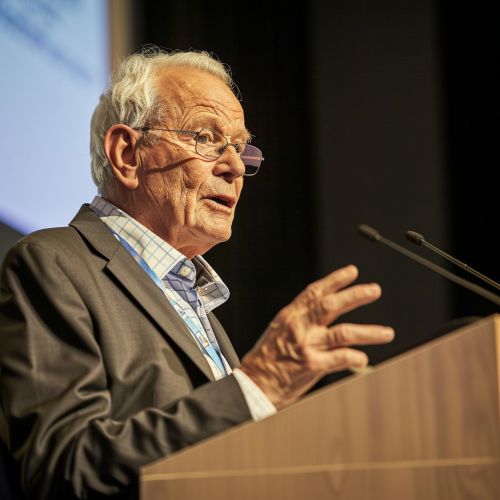Thomas Schelling: Difference between revisions
(Created page with "== Early Life and Education == Thomas Crombie Schelling was born on April 14, 1921, in Oakland, California. He was the son of John Schelling, a naval officer, and Zelda Ayres Schelling. Schelling's early education was marked by frequent relocations due to his father's career, which exposed him to various cultures and perspectives. He completed his undergraduate studies at the University of California, Berkeley, earning a Bachelor of Arts in Economics in 1944. Following h...") |
No edit summary |
||
| Line 13: | Line 13: | ||
Another key contribution was his analysis of [[credible commitment]] and [[deterrence theory]]. Schelling argued that the ability to commit credibly to a course of action is crucial in strategic interactions, particularly in the context of [[nuclear deterrence]]. His insights into the dynamics of threats and promises have had a profound impact on international relations and military strategy. | Another key contribution was his analysis of [[credible commitment]] and [[deterrence theory]]. Schelling argued that the ability to commit credibly to a course of action is crucial in strategic interactions, particularly in the context of [[nuclear deterrence]]. His insights into the dynamics of threats and promises have had a profound impact on international relations and military strategy. | ||
[[Image:Detail-93157.jpg|thumb|center|Thomas Schelling speaking at a conference.|class=only_on_mobile]] | |||
[[Image:Detail-93158.jpg|thumb|center|Thomas Schelling speaking at a conference.|class=only_on_desktop]] | |||
=== Micromotives and Macrobehavior === | === Micromotives and Macrobehavior === | ||
Latest revision as of 01:17, 22 June 2024
Early Life and Education
Thomas Crombie Schelling was born on April 14, 1921, in Oakland, California. He was the son of John Schelling, a naval officer, and Zelda Ayres Schelling. Schelling's early education was marked by frequent relocations due to his father's career, which exposed him to various cultures and perspectives. He completed his undergraduate studies at the University of California, Berkeley, earning a Bachelor of Arts in Economics in 1944. Following his graduation, Schelling served in the U.S. government during World War II, working on the Marshall Plan in Europe.
After the war, Schelling pursued graduate studies at Harvard University, where he earned a Ph.D. in Economics in 1951. His doctoral dissertation focused on national income behavior and was supervised by Wassily Leontief, a Nobel laureate in Economics.
Academic Career
Early Academic Positions
Schelling began his academic career as an assistant professor at Yale University from 1953 to 1958. During this period, he developed his interest in game theory and strategic behavior, which would later become central themes in his work. In 1958, he joined the faculty of Harvard University, where he remained for most of his career, eventually becoming the Lucius N. Littauer Professor of Political Economy.
Contributions to Game Theory
Schelling's most significant contributions to game theory are encapsulated in his seminal work, "The Strategy of Conflict," published in 1960. In this book, Schelling introduced the concept of focal points, also known as Schelling points, which are solutions that people tend to choose by default in the absence of communication. He demonstrated how these focal points can facilitate coordination in strategic situations.
Another key contribution was his analysis of credible commitment and deterrence theory. Schelling argued that the ability to commit credibly to a course of action is crucial in strategic interactions, particularly in the context of nuclear deterrence. His insights into the dynamics of threats and promises have had a profound impact on international relations and military strategy.


Micromotives and Macrobehavior
In 1978, Schelling published "Micromotives and Macrobehavior," a groundbreaking work that explored how individual behaviors and decisions aggregate to produce collective outcomes. One of the most famous models in this book is the Schelling segregation model, which illustrates how individual preferences for neighbors of the same race can lead to highly segregated communities, even when those preferences are not extreme.
Schelling's work in this area laid the foundation for the field of complex systems and agent-based modeling. His insights have been applied to various domains, including urban economics, sociology, and public policy.
Policy Influence and Consulting
Throughout his career, Schelling was actively involved in policy advising and consulting. He served as a consultant to various U.S. government agencies, including the Department of Defense and the Arms Control and Disarmament Agency. His expertise in game theory and strategic behavior made him a valuable asset in the formulation of defense and arms control policies during the Cold War.
Schelling was also a member of the President's Science Advisory Committee and the National Academy of Sciences. His work on climate change and environmental policy was particularly influential. He was one of the first economists to analyze the economic implications of global warming and advocate for international cooperation to address the issue.
Awards and Recognition
Thomas Schelling's contributions to economics and social science have been widely recognized. In 2005, he was awarded the Nobel Memorial Prize in Economic Sciences, shared with Robert Aumann, for "having enhanced our understanding of conflict and cooperation through game-theory analysis." The Nobel Committee highlighted Schelling's work on strategic behavior and its applications to international relations and arms control.
Schelling was also a recipient of the National Medal of Science, awarded by the President of the United States in 1991. He received numerous honorary degrees from prestigious institutions, including Yale University, the University of Cambridge, and the University of Chicago.
Legacy and Impact
Thomas Schelling's work has left an indelible mark on multiple fields, including economics, political science, and sociology. His innovative use of game theory to analyze strategic behavior has influenced generations of scholars and policymakers. The concepts of focal points, credible commitment, and the segregation model continue to be foundational in the study of strategic interactions and collective behavior.
Schelling's interdisciplinary approach and ability to apply theoretical insights to real-world problems have made his work highly relevant and enduring. His legacy is reflected in the ongoing research and policy discussions that build on his contributions to understanding conflict, cooperation, and complex social systems.
